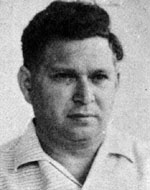Son of-Avraham-Abba and Hinda. He was born on February 21, 2121 in the city of Bendzin, Poland. He studied in a “cheder” in his hometown and in a Polish primary school, as was customary at the time. Belonged to the generation of “pioneers” who continue to be born and worked in Poland between the two world wars, a generation that predicted the Holocaust and the rebirth of Israel in his country. At a very young age, he joined the Gordonia youth movement and there he acquired the name of an active youth, gifted with talent and an excellent friend; That was when he began his training work. In 1938, he left for training in a town not far from Lodz, but with the outbreak of the Second World War the members of the hachshara dispersed and a new chapter in Zionist activity began when it went underground. Of course, Kalman was a partner in this work, whose purpose was to nurture and sustain the national spark – especially among the children. We then organized study groups throughout the ghetto, and the children, who were forbidden to attend school, found their counselors and teachers among the members of the youth movement (and Kalman among them). In 1940, Kalman was forced to unite the representatives of the “Gordonia” (farm secretariat) and establish an agricultural farm whose purpose was to provide vocational training for Jewish youth. This farm, established by the authorities, soon became the focus of Zionist, social, and underground activity among the Jews of Bendzin. Kalman was one of the pillars of this educational work in the activities of the close connection between the underground in the ghetto and the farm under his supervision. In 1942, the farm’s secretariat was informed of the existence of a list of people destined for “transport.” It was therefore decided that this list should be eliminated and Kalman took part in an activity that ended with success. Kalman was among the first to receive a visa to Paraguay, which meant saving lives – but he gave up this right and stayed on the farm with the rest. Popular, clever, a strong desire to live but also unreserved responsibility noted him and even in the most difficult conditions knew to keep cool and good temperament. In August 1943, in the middle of the night, friends-guards announced that Germans were surrounding the farm-and by morning all the members of the ranch were transported by car to the train on the way to Auschwitz. In the train, Kalman made an escape plan: he was the first to break out, provided that Ada (his girlfriend – and then his wife) would follow suit. But she refused to do so for fear of the Germans. When the Germans separated the men and the women, Kalman was still able to call out to Ada: “You must stay alive, we must meet again” – and with this promise, Ada bore all the sufferings of the camp. After a while Kalman was transferred to the coal mine in Ginter-Grova. As the front approached, and when the deportations began westward, Kalman fled and returned to Bendzin, hoping to meet Ada, but he did not find her there. The few Jews who had survived told him that in Romania there was still a Jewish settlement and then he went there – and again to find Ada, but he never found it again. When Kalman arrived in Bucharest he joined a group of “Irgun Ha – Bricha” operatives. Where he received an entry visa to Israel, but again he gave up on it and continued to search for Ada whom he loved. Only in early 1945 did he find her in Germany. Then they both went to Bayreuth, to the American occupation zone, and Kalman continued his Zionist activity, organizing the youth that had begun to arrive from Germany on his way to Israel. In 1947, Ada received a visa and accompanied her to Marseilles, because after years of activity in the movement, Kalman did not receive what Ada had won, and he was forced to try to immigrate without an immigration certificate illegally. The French arrested him and then was released and arrived in Paris with no penny in his pocket. Only by chance did he meet with two Zionist emissaries who helped him to arrive in Israel about a month after Ada. First they were absorbed in Mishmar Hasharon and then moved to Tivon, but only a few weeks passed and the War of Independence broke out. He was recruited and participated inWar with the rest and after his release began to settle in his home and family. He was an exemplary husband and father and bought him friends whom he loved and cherished because of his cordiality, good sense, and good smile. In Tivon he did not continue with public activity but remained loyal to his path and movement – and to his delight there was no limit to all its achievements. After the outbreak of the Sinai Campaign, he participated in it and then returned to his home and continued his life with his family and friends. Before the Six-Day War, Kalman volunteered for the IDF with his vehicle and asked him to be assigned the most difficult tasks, because he was willing to give his whole life for the homeland, but on Sunday, June 9, 1967, In his illness he left a wife and two daughters. He was laid to rest in the Kiryat Tivon cemetery.
